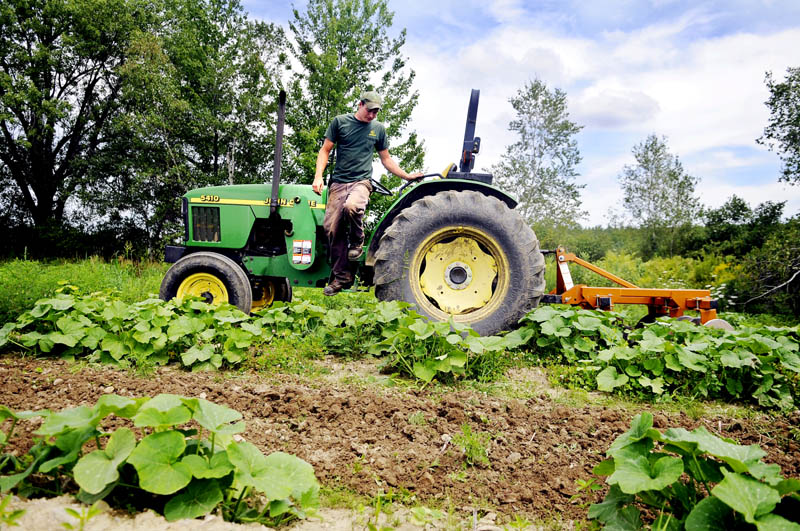The federal government announced Wednesday it is scrapping plans to require farmers to get commercial drivers licenses to operate their tractors.
The decision came after thousands of angry farmers and farm organizations blasted the measure as unnecessary meddling.
“I think the Department of Transportation was trying to elicit feedback from the farmers,” said Clark Granger, a board member of the Augusta-based Maine Farm Bureau. “They got an earful.”
The federal government has typically let states control rules governing farmers’ use of equipment, but earlier this year the U.S. Department of Transportation’s Federal Motor Carrier Safety Administration announced plans that would have required farmers across the country to secure CDL licenses to operate their equipment.
“If you get the hay in with the family help, they’d be required to get a license,” said John Field, a farmer from Union. “It’s hard enough to get people as it is. It’s totally unnecessary.”
Rob Johnson, executive director of the New Hampshire Farm Bureau, said the proposed law would have:
* Forced anyone who operates an implement of husbandry with a combined gross weight of 10,000 pounds or more, including tractors and wagons or equipment, to get a CDL license to operate the equipment on a public way.
* Expanded the definition of “interstate commerce” to include any product that may be shipped out of state, even if it is delivered within the state. For example, if a farmer picked corn in Readfield and delivered that corn to a seller in Portland, the entire shipment would be considered interstate commerce if any portion was bound for another state. CDL licenses are required for all interstate deliveries.
* Required all farmers to get a CDL license if they enter into a crop share agreement — an arrangement in which one farmer plants in another person’s field — if the landowner is given any portion of the crop as payment for using the field.
Farming advocate Lisa Hunt, of Newcastle, said the rule would have prohibited teenagers from operating machinery, and the physical requirements might have prevented older farmers from getting a CDL.
The licenses also require regular testing and meticulous activity logs, and are limited to those age 21 and older.
“The farmers have been hit by land regulations, taxes and higher fuel costs,” Hunt said earlier this week. “If this proposed rule change goes into effect, how are they supposed to hire outside people? It’s going to put a lot of farmers under.”
The public comment period on the proposed changes ended Aug. 1.
Anne Ferro, administrator of the Federal Motor Carrier Safety Administration, announced Wednesday the plans had been taken off the table.
“About 1,700 comments were received from the farming community and members of Congress,” Ferro said in a prepared statement. “The vast majority (asked) that we preserve the guidance that leaves states to carry out farm exceptions as they have for many years.”
Ferro said the rules were proposed when farm groups alerted the Ferro’s administration that certain states were no longer consistently allowing exemptions to CDL requirements for certain farm operations using crop share agreements.
“Follow-up conversations revealed that some states were misinterpreting several other areas of FMCSA guidance, such as the definition of interstate commerce and implements of husbandry,” Ferro said.
The process helped clarify those issues, Ferro said, and “reinforces states’ authority and oversight of agricultural exceptions from federal motor carrier safety rules to states.”
U.S. Sen. Olympia Snowe, R-Maine, one of 21 senators who signed a letter opposing the changes, said Wednesday she was pleased the “needless” regulations had been dropped.
“The Department of Transportation seems to have gotten the message loud and clear, there is simply no room for additional needlessly onerous red tape on American businesses,” Snowe said in a statement. “Farmers nationwide have struggled to thrive in the current economic environment, and requiring a commercial license to operate agricultural vehicles on the road is as nonsensical as it impractical.”
Granger said few of the farmers to whom he spoke were aware of the proposed rule changes. Most were incensed, he said, when they found out.
“If they all have to have commercial drivers licenses it’s going to hamstring farmers,” he said. “A lot of them aren’t going to be able to operate.”
Steve Christianson, manager at Belle Vue Farms in Readfield, was relieved to learn that the rules will not go into effect.
He said almost all of his equipment would have met the 10,000-pound threshold.
“We would have had to have everyone get CDL licenses, which is a lot of time and expense,” Christianson said. “Then we would have had to follow their guidelines.”
Craig Crosby — 621-5642
ccrosby@centralmaine.com
Send questions/comments to the editors.


